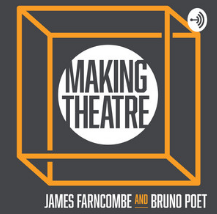 This is my review on the podcast “Making Theatre”. The podcast can be found on Spotify (I listen on there) – here is the link: https://open.spotify.com/show/3Sw78uA9ZpBLm4tqxezM6T?si=IyExU9jPSBmw4vmBwsUglA
This is my review on the podcast “Making Theatre”. The podcast can be found on Spotify (I listen on there) – here is the link: https://open.spotify.com/show/3Sw78uA9ZpBLm4tqxezM6T?si=IyExU9jPSBmw4vmBwsUglA
Overview
Making Theatre is a podcast, starring James Farncombe and Bruno Poet. They invite people who work in theatre, from backstage to onstage, to talk about what they do to help being a show to the stage. At the time of writing this review, there are 18 episodes, with each episode starring different people who work in all aspects of theatre. The guest speaks about their area of work within theatre, e.g what they do, what their job is like and who they have to collaborate with to make a piece of theatre come to life.
There is a wide range of jobs spoken about on the podcast, some of which are:
- Lighting/sound/set designers
- Stage/production managers
- Directors
- Fight directors/choreographers
- Costume/props supervisors
In the introduction to each episode, the music is happy and upbeat to get listeners in the mood for backstage theatre. Farncombe and Poet then introduce the guest(s) and give us a brief overview of their job in theatre.
A Specific Episode
I decided to listen to episode three again and focus on what happens in this specific episode. This episode invites Hetti Curtis and Laura Wilson to speak about their job in stage managing.
Farncombe and Poet describe this podcast as being about "the complex and messy process of making shows" and describe stage management as "very much the centre of this process and often sorting out the mess (both literally and metaphorically), and probably tidying up after the rest of [the workers] have gone home." They also describe them as "essential and crucial to any show, and often invisible to the public." In summary, Farncombe and Poet call them the "unsung heroes" of the stage.
Curtis and Wilson talk about things like what they have worked on in the past, what they worked in, where they studied, and previous work experience, such as physical acting, helping with backstage/tech in high school, etc. They also speak about the process in making a show, including but not limited to:
- relationships between colleagues
- their involvement in the show
- what they do in the show
- how they work with others
Likes and Dislikes
Personally, I love how much insight this podcast gave me into backstage theatre, and how so much information was included in each episode. I was able to listen as I did my everyday tasks, and this podcast made me want to learn even more about each job in theatre and how they work together to bring a show to life. Every episode is very relaxed, which I found ever so slightly shocking at first. There was a lot of shared laughs and jokes which I also enjoyed! I also really like the fact that there is also a quick fire round of questions at the end to get an insight of what the guest speaker likes and prefers over another option. I often try to answer these questions myself, which has proven difficult at times!
There was only one problem; that I found with this podcast) and that was the length of each episode. The episodes range from minutes to 1 hour and 30 minutes. I like listening to both podcasts and music in my everyday life, so sometimes when I listen to a podcast I might want to switch to listen to Music for a while and vice versa. When I do this, I often find that I lose where I am in the episode, so I’d have to fast forward through to find where I was. In my Opinion, the episodes could be a little shorter, and longer episodes could split into 2 parts.
Conclusion
Overall, the positives definitely outweigh the negatives, and I personally really enjoyed listening to this podcast! It was tun and entertaining, however also informative and educational. I’d definitely recommend listening to Making Theatre if you’re a theatre lover, critic, or worker!
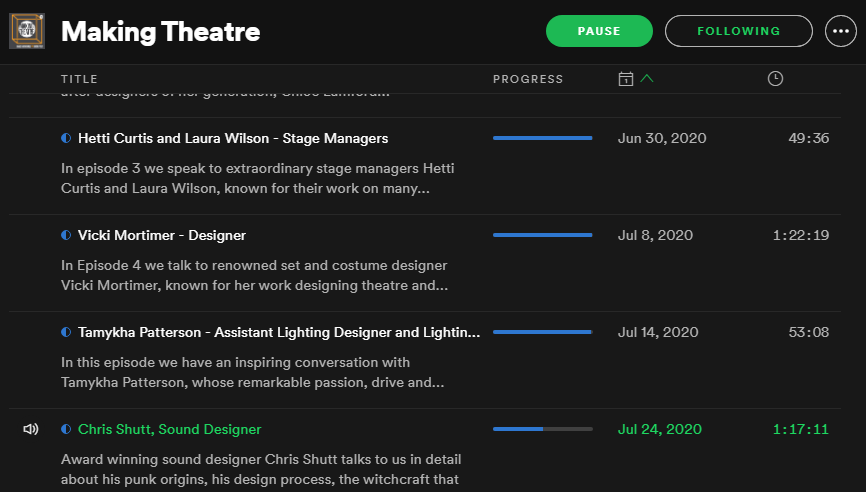


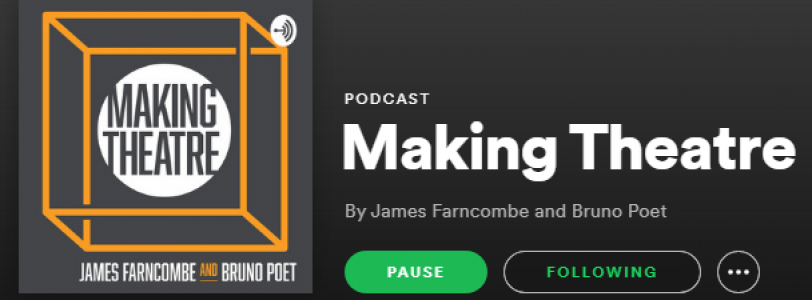
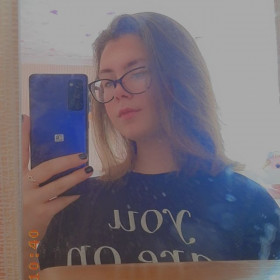
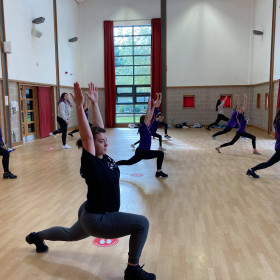



Great review of this podcast - I certainly learnt something new here. Would you say listening to the stage management episode helped you prepare to speak to the stage manager Heidi who came to talk to us on Zoom?
How did the creative aspects help - what is the sound quality like? Does it feel too informal, or does it feel quite formal?
Has it made an impact on the way that you consider backstage theatre work?
Annabel